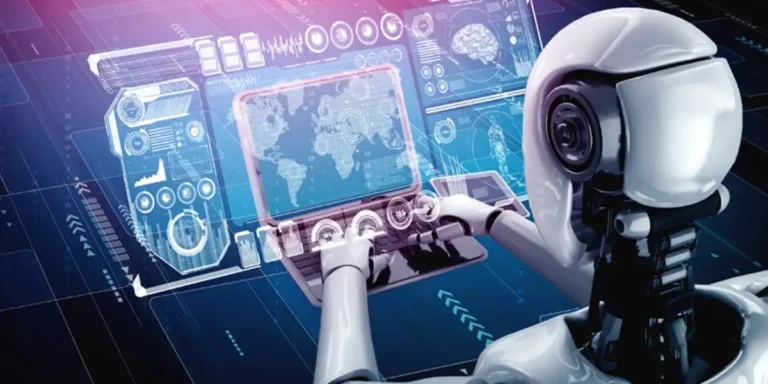As artificial intelligence (AI) is becoming better, it’s natural to question how it might affect different businesses. Civil engineering, in particular, is a subject
that depends a lot on the skills and decisions of people. In this blog article, we’ll talk about a topic that a lot of people have: will AI replace civil engineers?
We’ll talk about what AI can do now in civil engineering, what it might be able to do in the future, and what that all implies for the future of the field.

Will Ai Replace Civil Engineers?
No, AI will not replace civil engineers entirely, but rather augment their work. AI can assist with data analysis, design optimization, and other tasks, making engineers’ jobs easier. However, the complex and unpredictable nature of civil engineering projects requires human oversight and decision-making.
AI may replace some aspects of civil engineering jobs but not the entire profession.
The Impact of AI on Job Security for Civil Engineers

AI Improves Construction Safety
AI is transforming the construction industry, and it is helping to improve overall safety on job sites. Increasingly, cameras, Internet of Things (IoT) devices,
and sensors are being used on construction sites to monitor numerous development elements. AI can identify when incidents
are likely to happen and help stop them from happening. This is beneficial for both the construction industry and civil engineers as it can prevent injury and loss of life.
AI Enhances Construction Processes
AI has the potential to make a significant impact within the civil engineering sector by optimizing processes and improving product design, automating tasks, and reducing waste.
Quality management is one area where construction firms utilize deep-learning techniques to improve the level of quality of their construction processes.
AI can also help in smart construction design. This helps civil engineers optimize and improve their designs, reducing the likelihood of errors and improving safety.
AI Leads to Increased Efficiency
One of the main benefits of AI in civil engineering is increased efficiency throughout the entire value chain. From the production of building materials to the design,
planning, and construction phase, AI can help increase efficiency and reduce costs. This can help civil engineers work faster and
more efficiently to finish projects more rapidly. However, this can also lead to concerns about job security.
The Impact of AI on Job Security
AI in civil engineering threatens job security. AI is automating human work. This raises concerns that AI will displace humans and increase unemployment.
It is true that AI may replace some tasks currently done by civil engineers. However, civil engineers can adapt to remain relevant in the age of AI.
Adapting to Remain Relevant in the Age of AI
Civil engineers can remain relevant in the age of AI by adapting and learning new skills. One way to do this is by developing an AIOps mindset focused on
prediction overreaction, answers over the investigation, and actions over-analysis. Civil engineers can also learn to work with AI and utilize it to their advantage.
This can include programming and utilizing AI algorithms to optimize and improve construction processes.
Finally, civil engineers can focus on non-AI jobs like intricate problem-solving and decision-making.
AI’s Potential to Replace Civil Engineers
Here we examined the potential impacts of AI on civil engineering jobs and explored how AI could augment human intelligence rather than replace it.

AI’s Current Role in Civil Engineering
AI is already being used in civil engineering in various ways. AI can analyze massive data sets and find patterns humans may miss.
This can help engineers make more informed decisions about things like construction site locations, building design, and material selection.
In addition, AI can assist with tasks like survey data preparation, construction execution planning, and task management.
Engineers can focus on more complex and creative aspects of their work by taking over these repetitive and time-consuming tasks.
The Potential for AI to Replace Civil Engineers
Despite the benefits of AI in civil engineering, some may worry that it could eventually replace human workers. However,
the reality is that AI is unlikely to replace civil engineers in the near future completely. One reason for this is that civil engineering involves
a great deal of creativity and problem-solving. While AI can assist with some tasks, it currently lacks the creativity and critical thinking skills required to replace
human engineers. Furthermore, civil engineering often involves complex social and environmental considerations that are difficult for AI to grasp fully.
Human engineers are better equipped to navigate these nuances and make decisions that are in the best interest of all stakeholders.
The Role of AI in Augmenting Human Intelligence
Rather than replacing human engineers, AI has the potential to augment human intelligence and make civil engineering work more efficient and effective.
By taking over repetitive and time-consuming tasks, AI can free up engineers to focus on more complex and creative aspects of their work.
AI can also help engineers make more informed decisions by providing them with data and insights that would be difficult for humans to uncover on their own.
This can lead to more innovative and sustainable solutions to complex engineering challenges.
Expert Opinions on the Future of Civil Engineering and AI
Many civil engineering and AI specialists agree that while AI technology will become increasingly significant in civil engineering, it will not replace civil engineers.
Estimate of World Economic Forum
According to a World Economic Forum estimate, AI and related technologies would displace 20% of UK occupations in 20 years and 26% in China.
AI may displace certain civil engineering jobs, but its overall impact will likely be limited.
Institution of Mechanical Engineers Says
In a recent article from the Institution of Mechanical Engineers, AI technology may one day replace engineers, designers, and architects, but humans will decide how to use it.
Harvard Business Review
David De Cremer and Garry Kasparov argue in a Harvard Business Review essay that AI technology can enhance human intelligence rather than replace it.
They stress the necessity of human-AI collaboration for better results.
Training for the Future: Preparation Of Civil Engineers for AI Integration
Interest in Applied Math:
As a civil engineer preparing for AI integration, you should have a strong interest in applied math.
This requires a passion for math and the skill to apply it. Many civil engineering calculations use mathematics, geometry, and statistics, so you should be conversant with these.
By having a solid foundation in applied math, you will be better equipped to understand the algorithms and statistical models that are essential to AI integration in civil engineering.
Aptitude for Mathematical Calculations:
In addition to having a strong interest in applied math, you must also possess an aptitude for mathematical calculations.
This involves the ability to perform complex calculations accurately and efficiently.
You should be comfortable using mathematical software to solve complex problems. Civil engineers design and analyze buildings, bridges, and roadways.
AI integration will require you to use mathematical models and algorithms to optimize the design of these structures. Thus, this field requires high mathematics skills.
Description of Research Topic, Method, Sample, and Results:
When conducting research in civil engineering and preparing for AI integration, it is crucial to have a well-defined research topic, method, sample, and results.
Your research topic should be specific and relevant and should have clear objectives.
The research method should be designed to collect and analyze data in a way that allows you to draw meaningful conclusions.
The sample should be representative of the population you are studying, and the results should be accurate and clearly presented.
Comparison of Job Requirements to Education
Civil engineers need the necessary education and abilities to meet employment needs, including AI integration. Compare your education to employment
criteria to ensure job readiness. This involves analyzing job postings, researching civil engineering trends, and consulting experienced individuals.
Programming, data analysis, and machine learning may be needed for AI integration. Online classes, workshops, and conferences teach these abilities.
Staying current on AI and related technology ensures you can handle employment expectations.
High Growth Opportunity in Career
Career advancement is abundant in civil engineering. AI and associated technologies offer greater chances to learn and challenge yourself.
Civil engineers will be in demand in infrastructure development, sustainable design, and environmental cleanup.
Keep up with industry trends to take advantage of these changes. This may mean getting further education, attending conferences and workshops,
and finding mentors and professional networks. Civil engineering is a lucrative career with hard effort.
The Need for Training
Civil engineers must grasp AI and its potential effects. AI could change civil engineering design, construction, and maintenance.
Thus, civil engineers must learn AI to benefit from and overcome its obstacles.
The Role of Engineering Education
Engineering education plays a significant role in preparing civil engineers for the future of AI integration.
Universities and institutions should offer courses and programs that cover the basics of AI and its application in civil engineering.
These courses should include hands-on training and practical experience to enable students to understand the practical implementation of AI in their work.
Continuous Learning and Upskilling
Learning continues after graduation. To keep up with technology, civil engineers must keep learning.
Workshops, seminars, webinars, and on-the-job training help them do this. This will help them learn AI.
Collaborate with AI Experts
AI experts can help civil engineers grasp the technology and its applications. Working with AI experts will help civil engineers use AI efficiently.
Explore AI Integration in Projects
Civil engineers can also learn about AI integration by exploring the use of AI in their projects. By incorporating AI in their projects,
they can experiment with the technology and learn about its benefits and challenges firsthand.
Embracing Change
Finally, it is important for civil engineers to embrace change and view AI integration as an opportunity rather than a threat.
They should be open to learning new skills and incorporating AI in their work to stay competitive in the industry.
FAQs
Will AI Replace Civil Engineers Completely?
No, AI can help civil engineers by performing routine tasks and providing insights, but human creativity and critical thinking skills are still crucial in the field.
What Tasks Can AI Perform In Civil Engineering?
AI can assist in tasks such as data analysis, project management, and risk assessment, allowing civil engineers to focus on more complex tasks.
Will AI Reduce The Need For Human Labor In Civil Engineering?
It is possible that AI will automate some tasks, but human oversight and decision-making will still be necessary for civil engineering projects.
How Can Civil Engineers Prepare For The Impact Of AI?
Civil engineers can learn about AI and its potential applications in the field, as well as develop skills in areas that are less likely to be automated, such as project management and communication.
What Are The Benefits Of Integrating AI In Civil Engineering?
AI can help civil engineers make more informed decisions, reduce costs and risk, and improve project efficiency and accuracy.
Conclusion
While AI technology has the potential to streamline certain aspects of civil engineering work, it is unlikely to replace human civil engineers altogether.
The expertise and creativity of human engineers are invaluable in solving complex problems and ensuring public safety.
Rather than being replaced, civil engineers will likely continue to work alongside AI to make construction processes more efficient and effective.
So, don’t worry; your job as a civil engineer is safe for the time being.




